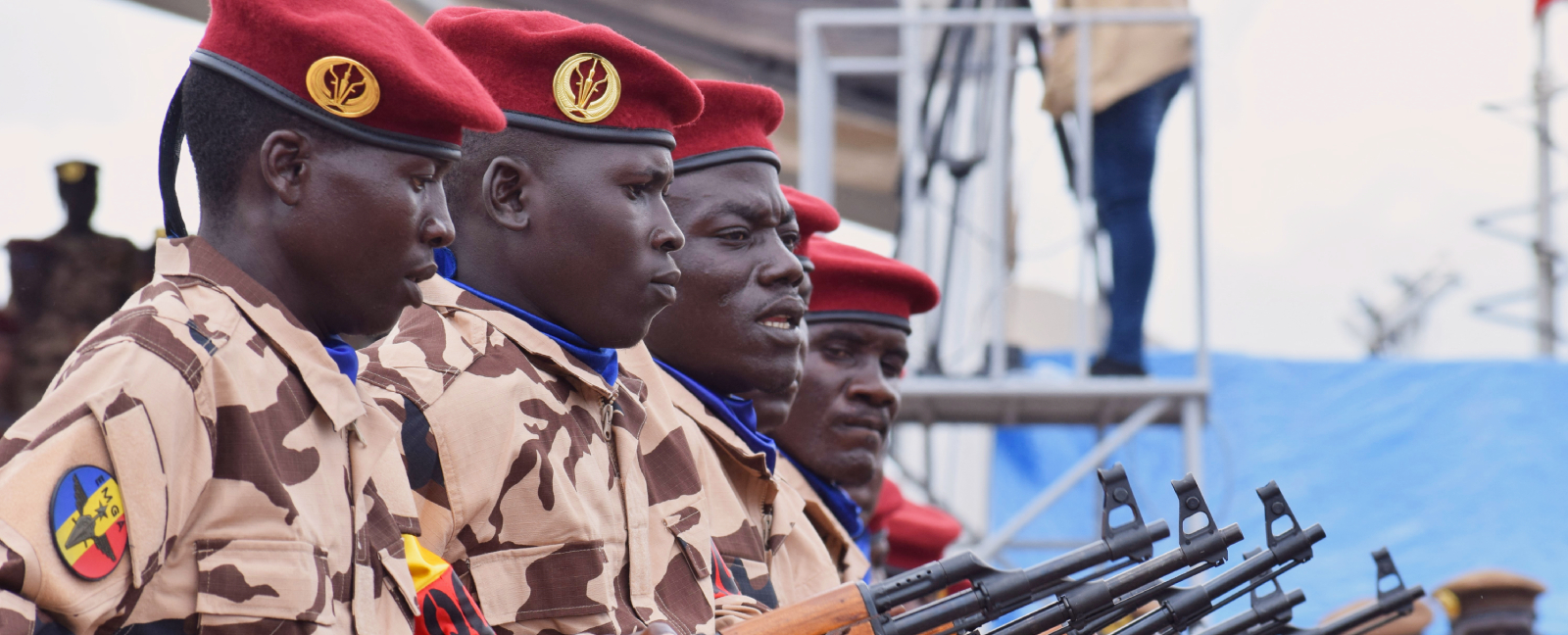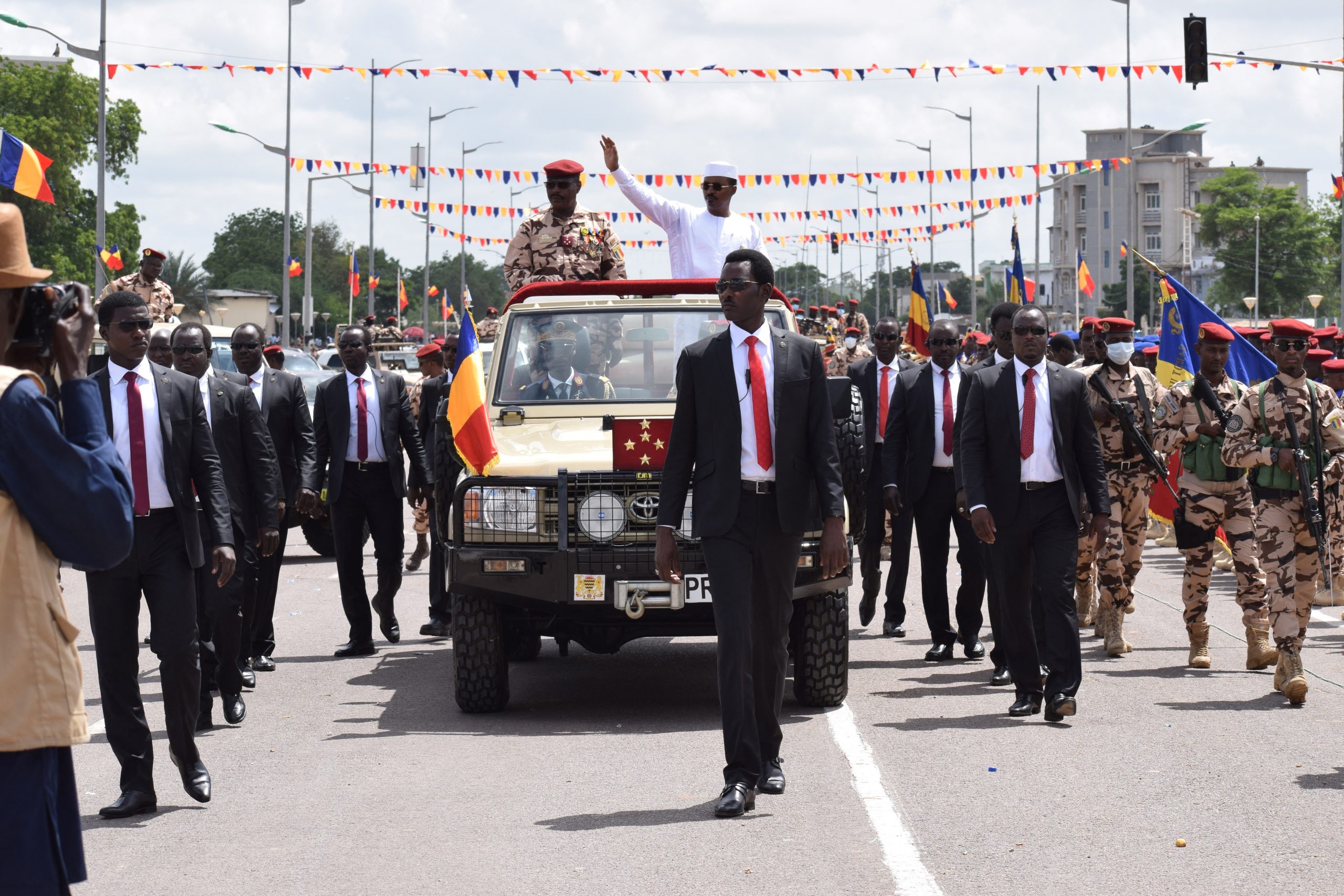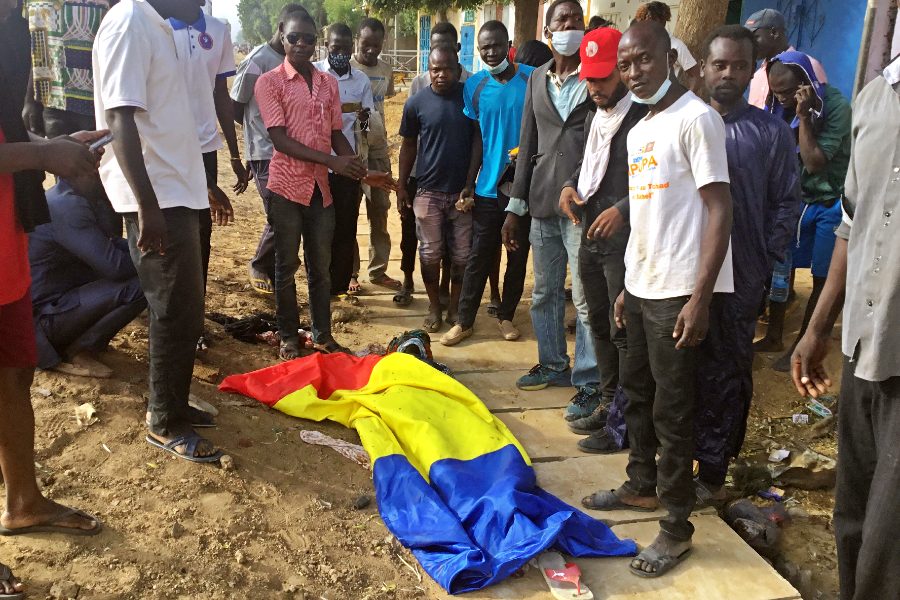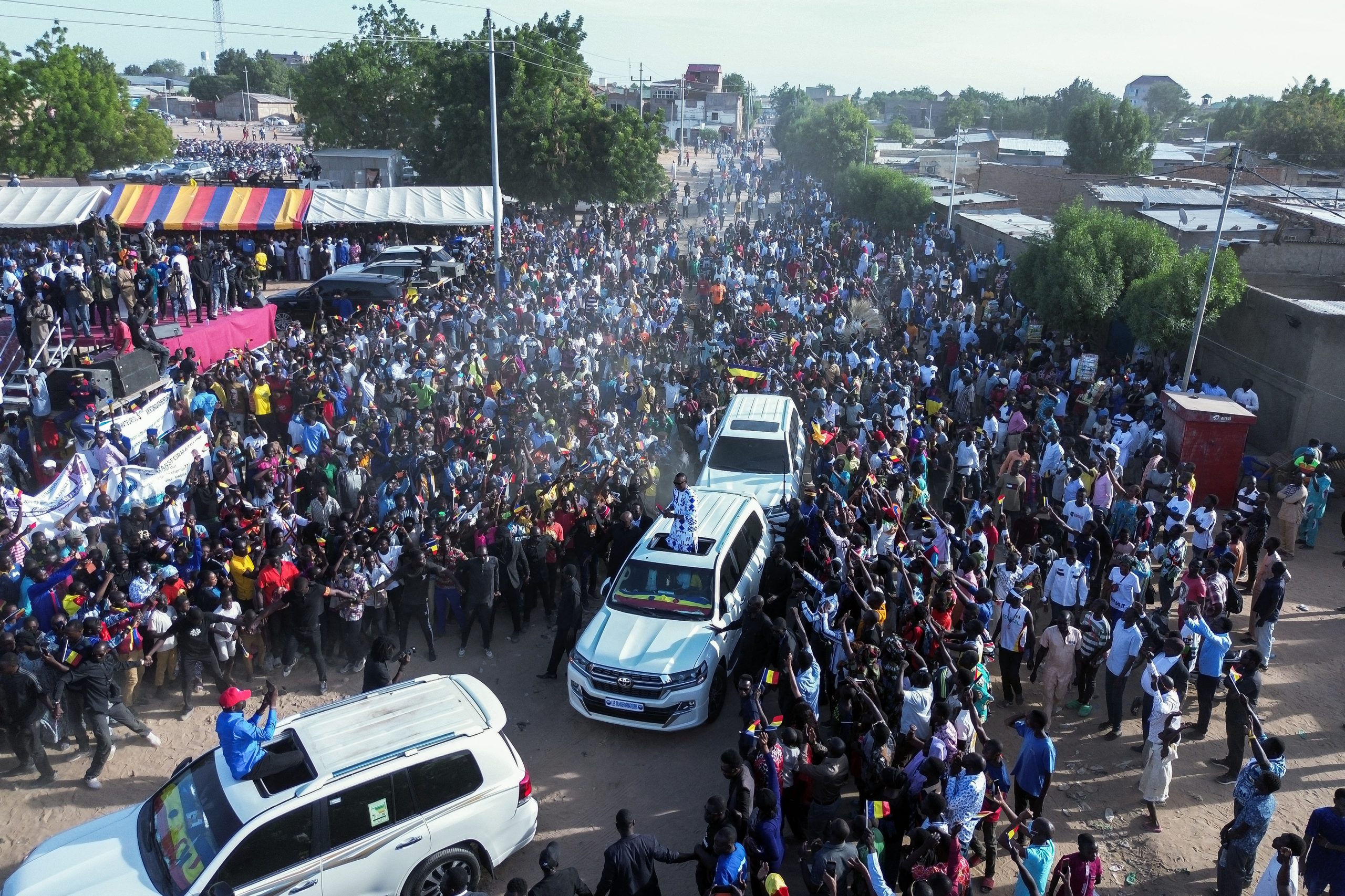
Members of the Chadian security forces parade during the 63rd Independence Day celebrations in N’Djamena on August 11, 2023. (Photo: Denis Sassou Gueipeur / AFP)
Chad’s constitutional referendum, scheduled for December 17, is the latest step by General Mahamat Déby’s military junta to stage-manage a transition that maintains the hereditary succession of the Déby dynasty and the military as a central political actor in this country of 18 million people that straddles six neighbors in the volatile Sahel region.
Civil society and opposition leaders have criticized the referendum process for its lack of inclusiveness and failure to consider key concerns of the political opposition such as intimidation, lack of freedom of speech and assembly, a partisan electoral management body, and consideration of decentralizing authority in the fifth largest country by land area in Africa. Most opposition parties have called for either a “no” vote or a boycott of the referendum.
Mahamat Déby came to power in a coup in April 2021 following the death of his father President Idriss Déby. The elder Déby died in a battle with one of several armed rebellions against his 31-year long autocratic rule. In accordance with the constitution, the president of the National Assembly ought to have assumed power as interim head of state organizing elections within 90 days to elect a new president. Instead, a group of military officers took power and proclaimed Mahamat Déby acting head of state, dissolved Chad’s political institutions, and suspended the constitution.
“The pattern of delay and obfuscation echoes the long-honed tactics of Idriss Déby who came to power by force in 1990 and then held on to it for three decades.”
The junta announced an 18-month political transition that would culminate with elections in October 2022. A key element of the transition timeline was to be an inclusive national dialogue that would generate consensus on a new constitution and political reforms. Yet, the Inclusive Sovereign National Dialogue (DNIS) was only convened in August 2022—2 months prior to the promised transition. Lacking significant opposition representation, Déby and a group of hand-picked organizers controlled the agenda. The outcome from the “dialogue” was a 2-year extension of the transition with Déby as interim president and the removal of a stipulation that interim leaders could not contest future presidential elections.
Reflective of the strong popular demand for democracy in Chad, leaders of the civilian opposition organized peaceful protests on October 20, 2022—the original 18-month transition deadline—calling for elected civilian rule. Chadian security forces fired live ammunition on the protesters. According to the opposition, hundreds were killed and thousands arrested, arbitrarily detained, sent to maximum security prisons, or disappeared.
The December constitutional referendum seems intended to provide a veneer of validation for the junta’s continued management of the transition leading to presidential elections in October 2024. The pattern of delay and obfuscation echoes the long-honed tactics of Idriss Déby who came to power by force in 1990 and then held on to it for three decades by evading term limits, resisting calls for democratic reform, and putting down multiple armed rebellions.
A Problematic Referendum
Déby has established the National Commission Charged with the Organization of the Constitutional Referendum (CONOREC) to organize and administer the referendum. Presently Chad’s sole electoral institution, CONOREC has been a source of controversy from its inception. All of CONOREC’s commissioners were appointed by Déby and exclusively comprise regime representatives and members of the transitional legislature.
Substantively, the opposition has long advocated for a transition to a federal system as a means of diffusing power to local authorities in this expansive country. The issue received considerable attention during the DNIS resulting in a resolution that the question of whether to shift to a federal system would be included in a referendum. Despite this, the December 17 referendum does not address the federalism issue. Rather it solely asks voters to accept or reject the draft constitution, which specifies a unitary state.

General Mahamat Idriss Déby Itno waves next to Chad Army Chief of Staff, General Abakar Abdelkerim Daoud, as they review troops during the 63rd Independence Day celebrations in N’Djamena on August 11, 2023. (Photo: Denis Sassou Gueipeur / AFP)
Many technical issues have plagued CONOREC’s efforts as well. Observers of the voter registration drive claim to have witnessed irregularities, including duplication of voter cards. Further, an audit by a third party hired by CONOREC found that the physical infrastructure and computer technology necessary for an election required significant repair or total replacement, including the computer servers. The audit was completed in May, but its contents only became public after they were published by RFI in June.
The lack of transparency around the audit and voter registration have created more distrust between CONOREC and the population. Even the Chadian Alliance for Democracy and Development, a party aligned with Déby, criticized the exclusion of political parties from the process following the audit.
Déby’s control of the referendum process appears to be a continuation of his effort to cement power and extend his father’s legacy.
Why it Matters
The 33 years of Déby rule have proven disastrous for Chad’s development. Chad continues to suffer from years of civil conflict, political instability, and economic mismanagement. Chad’s per capita income of $590 is the equivalent of what it was in 2004—the year after oil revenues first started flowing. The degree and persistence of the country’s underdevelopment is notable given that the oil sector provides about 60 percent of export revenues and up to one-third of overall GDP. This highlights the highly unequal distribution of these resources in a country that ranks 167 out of 180 on Transparency International’s Corruption Perceptions Index. Less than 10 percent of the population has regular access to basic sanitation and electricity. Just one in five adults are literate, and one in three births take place in the attendance of a health professional. Life expectancy is one of the lowest in the world at 53 years.
These dire conditions contribute to nearly 7 million Chadians—40 percent of the entire population—needing humanitarian assistance. This includes some 215,000 internally displaced people, mostly as a result of attacks by violent extremist groups around the Lake Chad region. These figures do not include the rapidly growing refugee population in the east of the country. Since the outbreak of conflict in Sudan in April 2023, nearly 500,000 Sudanese, mostly from the Darfur region, have fled to Chad in search of safety.
“Characterizations of Chad as a linchpin for stability in a region beset by insecurity ignore the continued rebellions waged by the armed opposition.”
Characterizations of Chad as a linchpin for stability in a region beset by insecurity ignore the continued rebellions waged by the armed opposition. The Front for Change and Concord in Chad (FACT), the rebel group against whom Idriss Déby was fighting when he was killed, is only one of at least four well-armed Chadian groups that have used southern Libya as a rear base. The leaders of these rebel groups trace their origins to previous rebellions in the 2000s. New armed groups have reportedly formed in the south of the country as well. This near constant status of armed rebellion has also been described as a state of in-between-wars.
Instability stemming from Chad’s persistent authoritarian governance makes the country more vulnerable to internal and external threats. An inclusive political transition affords Chad a potential off-ramp from such instability.
Amnesty and Dividing the Opposition
One method Idriss Déby long employed to sustain his decades-long hold on power was to intersperse repression of the political opposition with periodic attempts to co-opt and divide them. Similar patterns appear to be at play in the lead up to the referendum.

A body covered by a Chadian flag and surrounded by fellow demonstrators in N’Djamena on October 20, 2022. (Photo: AFP)
In the wake of the October 2022 protests and the Déby regime’s subsequent violent crackdown against peaceful protesters, many opposition leaders went into hiding. Prominent and vocal leaders of the opposition, including Succès Masra of Les Transformateurs and Max Loalngar of the Wakit Tama coalition, sought refuge outside the country. Members of Les Transformateurs and Wakit Tama were prohibited from meeting, and dozens of political leaders within the opposition were targeted with arrests and harassment. Security forces also sacked Les Transformateurs’ headquarters.
On October 5, 2023, Masra informed the Déby regime of his intention to return to Chad ahead of the anniversary of the 2022 protests. Later that day, an international arrest warrant calling for his apprehension for crimes including “an attempted attack on constitutional order, incitement to hatred, and insurrectional uprising” circulated on social media.
Three days later, security forces jailed 72 supporters of Les Transformateurs after arresting them while they were exercising at a sports field. Lawyers for the detained reported that they had not been charged with a crime and did not have access to legal counsel. Citing security concerns, Masra announced that he would delay his return.
In the last week of October, Masra met with a delegation led by Déby’s transitional minister of national reconciliation, Abderaman Koulamallah, in Kinshasa, with President Félix Tshisekedi serving as mediator. The resulting agreement cleared the path for Masra’s return and permitted him to continue his political activities. Days after the two sides signed the agreement, the junta released the detained 72 members of Les Transformateurs.
“By entering into an agreement with one opposition party, the Déby regime has contributed to an atmosphere of mistrust among others.”
The agreement, however, has not been embraced by all corners of the opposition. The proposed amnesty for security leaders responsible for the deadly violence on October 20, 2022, incensed many opposition parties, including some members of Les Transformateurs. They argued that amnesty would fail to provide justice for the victims and their families and that it absolves the Déby regime of any accountability. On November 23, the transitional legislature, composed of Déby-appointed legislators, voted to adopt the amnesty law.
Although the agreement also created a pathway for other Chadians in political exile to return home, opposition groups, such as Wakit Tama and Les Démocrates, have strongly voiced their rejection of the agreement, from which they felt sidelined. By entering into an agreement with one opposition party, the Déby regime has contributed to an atmosphere of mistrust among others.
This divide and conquer tactic may undermine the opposition’s cohesion and weaken its demand for a legitimate, inclusive democratic transition. It may also lessen criticism of the transition ahead of the constitutional referendum.
Envisioning an Inclusive Transition for a Stable Chad
The neutered transition underway in Chad increases risks for internal instability. As the coup against Ali Bongo in Gabon demonstrates, dynastic politics that keep one family in power for decades can come to a quick and unexpected end. Often overlooked within the Chadian context is that there is a legitimate civilian opposition pushing for democratic change.
“Often overlooked within the Chadian context is that there is a legitimate civilian opposition pushing for democratic change.”
Members of the opposition argue that the referendum should be delayed until there is a genuine dialogue on key constitutional issues like guaranteed space for the political opposition, an independent electoral commission, and federalism.
For three decades, civilian opposition leaders have been excluded from the political process. A new dialogue with a representative commission might provide a useful reset. This might also provide a good opportunity for the representative body to determine the contents of an actual political transition, rather than leaving such decisions entirely up to Déby and his military backers.

Supporters of the Chadian opposition party Les Transformateurs welcome Succès Masra as he addresses them in N’Djamena for the first time since his return from exile. (Photo: Denis Sassou Gueipeur / AFP)
While the Déby regime has received strong regional and international backing, by ignoring opposition groups, the likelihood of political violence increases. Extending recognition and providing a platform for opposition groups advocating for political inclusion would be a start. Ensuring all political parties at least do not face arbitrary harassment should be a minimum baseline.
Given its history and the volatile region, a strong Chadian military will remain a central feature in any civilian government. A genuine national dialogue would provide an opportunity for envisioning a military outside of the political process. This would allow the military to focus on addressing the serious security threats confronting the country. A civilian government would also open Chad up to expanded private investment, development assistance, and security cooperation. All of these would improve the overall defense readiness and effectiveness of the security sector. An inclusive civilian-led transition with buy-in from all political actors may also reduce the internal ongoing conflicts that have destabilized Chad for years.
Additional Resources
- Africa Center for Strategic Studies, “Term Limit Evasions and Coups in Africa: Two Sides of the Same Coin,” Infographic, October 24, 2023.
- Ladiba Gondeu, “Chad’s Political Transition Might Be Its Last Shot for Democracy and Peace,” United States Institute of Peace, July 6, 2023.
- Remadji Hoinathy and Yamingué Bétinbaye, “Chad Two Years Later: Little Progress, Plenty to Worry About,” Institute for Security Studies, May 4, 2023.
- Katie Nodjimbadem, “Chad’s Coup Leader Stops Democracy in Its Tracks,” Foreign Policy, December 6, 2022.
- Daniel Eizenga, “‘Transition’ Orchestrated by Chad’s Military Goes Awry,” Spotlight, Africa Center for Strategic Studies, November 15, 2022.
- Africa Center for Strategic Studies, “Autocracy and Instability,” Infographic, March 9, 2021.
More on: Democracy The Sahel Africa’s Crisis of Coups

